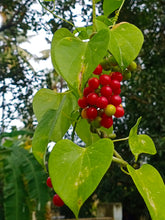- Home
- Medicinal Plants
- Tinospora cordifolia - Medicinal...
Tinospora cordifolia - Medicinal Herbs



Tinospora cordifolia - Medicinal Herbs




Damaged or lifeless? We’ll replace it for free. Learn more

Double layered custom boxes to protect plants during shipping.

Air vents for proper air-flow

To preserve plant freshness during transit

Details steps of how to grow and maintain your plant
Giloy or Heart-Leaved Moonseed or Guduchi Botanically known as Tinospora cordifolia from Menispermaceae family. It is Herbaceous vine and indigenous to tropical regions of the Indian subcontinent. It is a large, deciduous, extensively-spreading, climbing shrub with several elongated twining branches. Leaves are simple, alternate, and exstipulate with long petioles, which are roundish and pulvinate, both at the base and apex with the basal one longer and twisted partially and half way around. It gets its name heart-leaved moonseed by its heart-shaped leaves and its reddish fruit.
In Ayurved, Giloy has been used over centuries to treat various diseases. Due to inadequate design or other weaknesses of clinical research on Tinospora, there is no high-quality scientific evidence that it has any anti-disease effect, and is not used as a prescription drug. So it is always better to use it with advice from an expert.
Selected plant of 8-10 inches
Planted into a 5-inch pot
With healthy, moisture-retaining soil
A care instruction sheet for maintenance guide

Get in touch for best pricing on bulk orders and landscaping projects.
 WhatsApp us
WhatsApp us

Call on 9177805454 (Mon-Sat, 9 AM-6 PM) or WhatsApp us – we’re here to help.
About Exotic Flora
At Exotic Flora, we’re passionate about bridging the gap in bringing plants to everyone. With over 500+ varieties across 7 plant categories, from exotic finds to everyday greens, we bring the entire range to you.
Our plants, sourced from all parts of India are nurtured at Kadiyam, in our 25 acres in-house nursery by a team of expert horticulturists. Once they are ready we ship all our plant varieties across India.
Our services go beyond safe delivery of plants. A dedicated support team is there to help you with any maintenance queries you may have.
At Exotic Flora we always believe in going that extra mile, because everyone should have the plants they love.
Every plant has different plant parts to use as a medicinal plant it may be in its leaves, roots, stems, flowers or other parts of the plant. For full details look at the descriptions of individual plants.
Citronella grass, Lemon grass, Rosemary, Marigold, Mint Tulasi etc
Some plants need indirect bright light & others need direct bright light and some can grow in both direct and indirect sunlight. So please look at the description of each individual plants.
The soil should be well drained, fertile and rich in organic content. A mixture of garden soil, cocopeat, compost will give the best results for your plants.
Remember overwater can kill your plant(make sure that your pot should have drainage hole). Water when the topsoil(2-3 inch) feels dry to touch. In general moderate watering(in every 3-4 days)
Regular pruning of diseased and damaged parts of the plants. Regular watering, proper ventilation & sunlight, organic manure & fertilizers application.
In general you can grrow in indirect bright light conditions like basil, rosemary, mint, Centella asiatica, Maghai paan / betel leaf.
Tulsi has been used for thousands of years in Ayurveda for its diverse healing properties apart from devotional purpose.
No, both are different plants, Tulsi which is commonly known as holy basil, where as mint tulsi is closely related to holy basil & doesn't have devotional property.
Stevia is a sugar substitute made from the leaves of the stevia plant. It's about 100 to 300 times sweeter than table sugar, but it has no carbohydrates, calories, or artificial ingredients.
Costus igneus, commonly known as insulin plant in India. Consumption of the leaves are believed to lower blood glucose levels, and diabetics.